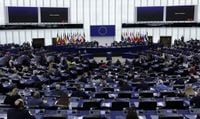An Italian court has delayed the transfer of Lucia Simeone, an assistant to European Parliament member Fulvio Martusciello, who is embroiled in a cash-for-influence scheme involving Huawei. The court's decision came after Simeone's lawyers raised serious concerns regarding prison conditions in Belgium, where she is set to be extradited. The ruling, which was expected on April 1, 2025, has been postponed until April 15 to allow Belgian authorities time to respond to the issues raised.
Simeone was arrested in Italy on March 20, 2025, on charges of criminal association, money laundering, and corruption, linked to an ongoing investigation into Huawei's actions within the European Parliament. Notably, Martusciello, who is a member of the European People's Party, has not been charged with any crime in connection with this case.
Her defense team argued that transferring her to Belgium would be "inadvisable," particularly since she is currently under house arrest in Italy, a privilege that may not be extended to her in Belgium. The legal team submitted a medical certificate that highlighted Simeone's fragile psychological state, raising further questions about her treatment in a foreign prison environment. Their inquiries included the availability of psychiatric care and whether the Belgian penal system adequately ensures fundamental human rights.
The Naples court, which is handling the case, has set a deadline of April 15 for Belgian authorities to address these concerns. If the conditions in Belgian prisons do not meet the standards required by Italy, the country could refuse to extradite Simeone, allowing her to remain free in Italy while awaiting trial.
Meanwhile, the situation surrounding Abdelkader Belliraj, who was recently pardoned in Morocco, has also drawn attention. Belliraj was serving a 25-year sentence for leading a terrorist network and for six politically motivated murders that occurred in Belgium during the 1980s. His sentence was reduced in 2022, and he was unexpectedly released on March 31, 2025, after being informed of his pardon late that evening.
Belliraj's case is particularly complex; although he was suspected of involvement in the murders, including that of Dr. Joseph Wybran, the former Chair of the Coordinating Centre for Jewish Organisations in Belgium, he has never been formally charged in Belgium. The statute of limitations for these crimes expired in 2020, effectively barring any prosecution.
His lawyer, Abderrahim Lahlali, described the announcement of Belliraj's release as surprising, although he acknowledged that an early release had been anticipated following the reduction of his sentence. Lahlali emphasized that sufficient evidence to charge Belliraj was never found, leading to the closure of the case at the request of the public prosecutor.
Adding to the intrigue, Belliraj has a controversial history with the Belgian State Security Service, having previously worked as an informant. It is believed that his tips may have helped prevent a terrorist attack in Europe, although the State Security Service has never officially confirmed this relationship.
The juxtaposition of these two cases highlights the ongoing complexities within the European legal system, especially regarding extradition and the treatment of individuals accused of serious crimes. As the Italian court prepares to make its decision regarding Simeone's transfer, the implications of Belliraj's release continue to reverberate through Belgium and beyond.
Both cases underscore the ongoing challenges faced by European nations in balancing legal obligations with the protection of individual rights. With the upcoming decision on Simeone's extradition, the spotlight remains on how member states navigate these intricate legal waters.
As the April 15 deadline approaches, the legal teams involved in Simeone's case are poised to argue vigorously for her rights, while the broader implications of Belliraj's release continue to unfold. The outcomes of these cases could set significant precedents for future extradition and legal proceedings within Europe.






